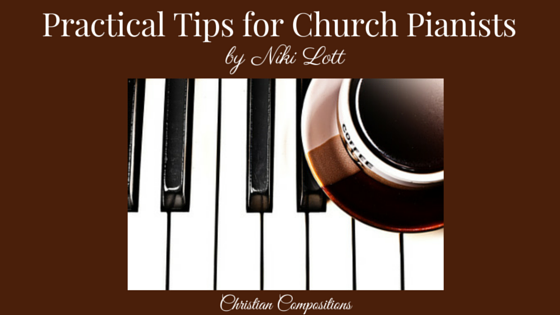 In my last post, I told you my first experience with playing a prelude. In this post, I’ll share some of the things that helped me as I began to play preludes on a regular basis.
In my last post, I told you my first experience with playing a prelude. In this post, I’ll share some of the things that helped me as I began to play preludes on a regular basis.
1. Discover Your Purpose
As a general rule, there are two basic purposes for a prelude:
a.) to provide background music before a service, and
b.) to prepare people for the beginning of the service.
While the purpose is fairly straightforward, how it is accomplished can vary depending on the type of service in which you are playing. For example, a wedding prelude would be substantially different than a funeral prelude. The prelude you play for a Sunday morning church service may be different from what you would play on a Wednesday evening.
Because of this, you need to choose your music carefully. For a church service, a prelude should typically be uplifting and encouraging. While “meditative” songs are not completely out of the question, most pastors want to begin the service with a spirit of anticipation and excitement. “Does Jesus Care” is a beautiful song that would be well-suited to a prelude before a funeral service, but probably not for a prelude just before the Sunday morning worship service (Be sure to talk to your pastor about what his goals are for the service music, including the preludes!). In the case of a church service, part of your purpose is not only to help the audience to be aware that the service is about to begin, but to help prepare their hearts before the service begins.
Also, be aware of your volume. Play loud enough to be heard, but not so loud that people cannot converse in the auditorium. There is no hard and fast rule for this, but you need to be aware of and sensitive to it. If you are playing in a large auditorium, you may not have to be overly concerned, but in a smaller auditorium, or if your piano is amplified, you need to pay attention.
I remember attending a church once where the pianist played the prelude so loudly that people would go to the foyer to talk, or would have to practically yell if they stayed in the auditorium. That is not our intent! Our goal is not to draw attention to the piano, or to provide a pre-service concert. Remember, a prelude is to be background, not foreground. We should not seek to be the “attraction”.
2. Decide What You Will Play
I mentioned this already, but the songs you choose are important, and should be appropriate for the service in which you are playing. (I am using examples for church services, but the principles hold true for other settings as well.) Here are a few rules of thumb:
A. Select songs that are familiar
Many people won’t think about what you’re playing, but those who are already seated will enjoy being able to sing along, and that will help prepare their hearts for the service to come.
B. Select songs that are suited to the service (some general guidelines)
- Sunday Morning Worship – Anthems, Hymns
Examples: To God Be the Glory; Crown Him With Many Crowns; There Is A Fountain
- Sunday Evening – Songs of Testimony, Encouragement
Examples: He Keeps Me Singing; Isn’t the Love of Jesus Something Wonderful; I Am Resolved; Stand Up, Stand Up for Jesus
- Wednesday Evening – Songs About Faith, Prayer, the Word of God
Examples: ‘Tis So Sweet To Trust In Jesus; The Bible Stands; Tell It To Jesus
C. Select songs you are comfortable playing
While preludes provide a good opportunity to implement new songs or new techniques, you still want to make sure that you can play them well. We should not be a distraction.
D. Select songs in an orderly fashion – Have a Plan!
When I first started playing preludes, I made prelude lists. Although I no longer carry a list to the piano, they are a great tool. If you play a short prelude, or are very comfortable playing by ear, you may not need to write out a list. However, if you are just beginning, or if you are playing a longer prelude, lists can really help, especially if you don’t want to have to try to flip pages between each song. (This is assuming you can play some from memory or by ear. If not, you will need to have a plan in place to make a prelude notebook, or mark songs in the hymnal so you can transition quickly between songs).
Here is how I built my prelude lists:
1. By Theme – This is still my favorite way to play a prelude. Whether anyone recognizes your theme or not, it is a good way to select your music, and set a tone for the day. If you know what your pastor is preaching on, you may select music to support that. Using a theme will also help you remember what to play next! As a rule, I play two verses of each song, but often change that based on the song or situation. Some theme ideas (you can also look through the topical index in the back of your hymnal for ideas):
- God’s Love
- Christian Warfare
- The Blood of Christ
- Faith/Trust
- The Word of God/God’s Promises
- The Name of Jesus
- Joy
- The Second Coming
- The Cross
- The Resurrection
One last tip – If you need to play from the hymnal, most books are arranged by theme. You can just choose a section and play through it.
2. By Key Signature & Modulation – Once I had selected my songs, I arranged them in order by their key signatures. On my list, I placed the title of each song, and the key signature. (If you are an experienced pianist, you can skip this section. :)) Because I was just learning how to modulate between different keys, I made sure to arrange my songs in an order that allowed me to change keys easily. I also wrote out the chords I would use for a modulation if it were something new or a little difficult for me. If you aren’t yet comfortable with changing keys between songs, try to select songs that are in the same key and just work on smooth segues from one song to another.
As you begin practicing modulations (and you should practice them!), choose simple modulations, and arrange your songs accordingly. While this is not a technical lesson on modulating, some of the easiest modulations are moving up one half-step, or one whole step (Example: From F to G, or from G to A-flat).
Although this post may not apply to you in your current situation, learning to create and play a prelude is a skill that is beneficial for any pianist to develop and polish. I hope these tips will help!



